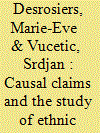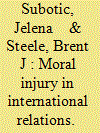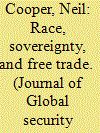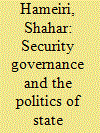|
|
|
Sort Order |
|
|
|
Items / Page
|
|
|
|
|
|
|
| Srl | Item |
| 1 |
ID:
162759


|
|
|
|
|
| Summary/Abstract |
The “big tent” mission of the Journal of Global Security Studies is well illustrated by this issue, as our first four articles explore issues from ontological security to cyber secrecy to sexual torture to traditional analyses of compellent threats. The next three articles illustrate the value of conversation between different parts of the field in their juxtaposition of arms control, humanitarianism, and empire; security governance and domestic politics; and reflexivity about casual claims in the study of ethnic conflict. Our final article, a research innovation, issues a critique of a well-respected network dataset.
|
|
|
|
|
|
|
|
|
|
|
|
|
|
|
|
| 2 |
ID:
162766


|
|
|
|
|
| Summary/Abstract |
What does causation mean in conflict studies? Using a sample of published qualitative, article-length studies on the Rwandan and Yugoslav wars, this article finds a lack of reflexivity over causal claims in scholarship on conflict. Causal language is not as pervasive as expected, asserted cause-effect relationships are rarely fully explicated, and scholars under-explore their causal assumptions. Considering that ideas on causation necessarily condition explanations of conflict, including “ethnic” conflict, this is a major research issue. While there exists a lively debate between different causal narratives regarding the onset of conflict—with studies alternatively stressing “attitudes,” “conditions,” or both—it stops short of addressing issues at the deeper level of causal understandings. For the most part, studies subscribe to the search for empirical generalization, thus limiting attendant debates to a single model of causation. These findings indicate that conflict studies literature would benefit from greater reflexivity and pluralism with regards to causation and paying more attention to philosophical debates on the subject. The article provides a basic outline of this reflexive agenda.
|
|
|
|
|
|
|
|
|
|
|
|
|
|
|
|
| 3 |
ID:
162767


|
|
|
|
|
| Summary/Abstract |
Machine-coded event datasets have become popular in conflict research. I argue that systematic media biases render news-based event data unsuitable for studying networks of insurgents and political parties. Insurgent networks are too secretive to be captured by media reports, whereas alliances among regular political parties are too constant to be considered newsworthy. I analyze the data accuracy of the network study of insurgents and political parties in Thailand by Metternich et al. (2013), which is based on the most comprehensive event dataset currently available: Lockheed Martin's International Crisis Early Warning System (ICEWS) project. Using simple evaluation criteria, I show that most of the network data entries are incorrect, leading to a depiction of the networks that is unrelated to real-world cleavages in Thailand. While my hand-coded event dataset captures relatively more network-relevant information than ICEWS, the comparison confirms that journalists specifically underreport cooperative events among insurgents and parties. In addition, the ICEWS project provides unreliable counts of conflictual events in Thailand. Using alternative conflict measurements from the Deep South Watch dataset and a dummy variable based on established periods of unrest, I show that violent activities in Thailand's Deep South declined during periods of conflict between pro- and anti-Thaksin groups. Conflicts were unrelated to network fragmentation, contradicting the primary finding of Metternich et al.
|
|
|
|
|
|
|
|
|
|
|
|
|
|
|
|
| 4 |
ID:
162760


|
|
|
|
|
| Summary/Abstract |
The war in Iraq unleashed disastrous global instability—from the strengthening of Al-Qaeda, to the creation of ISIS, and civil war in Syria accompanied by a massive exodus of refugees. The war in Afghanistan is continuing in perpetuity, with no clear goals or objectives other than the United States’ commitment to its sunk cost. The so-called war on terror is a vague catch-all phrase for a military campaign against moving targets and goalposts, with no end date and no conceivable way to declare victory. The toll of these wars on civilians in Iraq and Afghanistan and elsewhere in the Middle East, on US troops, and on the US economy is staggering. But these ambiguous campaigns are also fundamentally changing US state identity—its view of itself, its role in the world, and its commitment to a liberal international order. They are producing profound anxiety in the US body politic and anxiety in US relationships with other international actors. To understand the sources and consequences of this anxiety, we adopt an ontological security perspective on state identity. We enrich ontological security scholarship by introducing the concept of moral injury and its three main consequences: loss of control, ethical anxiety, and relational harm. We demonstrate how the concept of moral injury illuminates some of the most central anxieties at the core of US identity, offering a new understanding of our global moment of crisis.
|
|
|
|
|
|
|
|
|
|
|
|
|
|
|
|
| 5 |
ID:
162764


|
|
|
|
|
| Summary/Abstract |
This paper contributes to the literature on norms, arms regulation, humanitarian arms control, and arms control as governmentality by examining the different “Matryoshka dolls” of arms trade governance as they operated in the late nineteenth century. I suggest that analysis of practices in this era has relevance for debates about contemporary arms governance. The innermost doll is represented by a specific regulatory initiative, in this case, the 1890 Brussels Act, which represented an attempt to graft a regulatory arms trade norm onto an established and constitutive anti-slavery norm. The Act was also located within the second matryoshka doll, the broader approach to arms trade prohibition adopted in an era. Despite representations of the period as one of free trade in arms, I highlight extensive efforts to restrict the transfer of firearms to colonial subjects. Finally, I examine the third matryoshka doll, the way in which mechanisms of prohibition and permission constitute the practices of arms control as governmentality—the effort to define and manage which gradations of people can legitimately own, trade, and use which gradations of weapons in what contexts. Overall, the paper challenges the optimistic literature regarding humanitarian arms control and arms trade norms with three concluding implications: the merging of humanitarianism and arms control can reflect both good and bad norms; such a confluence is not necessarily incompatible with colonialism, racism, or imperial violence; and, such a merger is consonant with the maintenance of liberal militarism.
|
|
|
|
|
|
|
|
|
|
|
|
|
|
|
|
| 6 |
ID:
162761


|
|
|
|
|
| Summary/Abstract |
Cyberspace affords actors unprecedented opportunities to carry out operations under a cloak of anonymity. Why do perpetrators sometimes forgo these opportunities and willingly claim credit for attacks? To date, the literature has done little to explain this variation. This article explores the motivations behind voluntary credit-claiming for the two main actors in cyberspace: states and politically motivated nonstate actors. We argue that states are most likely to claim credit for their operations and to do so privately when the goal is to coerce an opponent. Nonstate actors tend to publicly claim credit for their attacks in order to showcase their capabilities, influence public opinion, and grow their ranks. We use case narratives to assess the plausibility of our argument and find strong support. This article places cyberspace operations in conversation with the larger literature on secrecy in international relations and advances a common framework for understanding how both states and nonstate actors operate in this evolving domain.
|
|
|
|
|
|
|
|
|
|
|
|
|
|
|
|
| 7 |
ID:
162765


|
|
|
|
|
| Summary/Abstract |
A rapidly growing, self-identified scholarly subfield on “Security Governance” has recently emerged. Its signal contribution has been to explicate the expansion of security governance beyond traditional defense multilateralism to include diverse actors, networked transnationally across multiple scales. However, this literature is predominantly descriptive and evaluative. Lacking an explanatory theory, it struggles to explain security governance outcomes convincingly. This article advances this body of literature by presenting an explanatory theoretical framework, which sees security governance as being produced through struggles over the appropriate scale of governance and the transformation of state apparatuses, shaped by specific state-society and political economy contexts. This framework is used to explain outcomes in the governance of money laundering and terrorist financing in the Asia-Pacific region and in Africa. Contrary to the expectations of Security Governance scholars that states in these regions generally fail to engage in security governance, the case studies illustrate that significant governance innovation has in fact occurred. This innovation is not the result of supranational multilateralization, but of the transformation and partial internationalization of domestic institutions– to an extent determined by local socio-political struggles over governance rescaling. Our framework thus accounts for real world outcomes; explains, rather than merely describes, the functional efficacy of security governance regimes; and enables normative assessment by identifying the winners and losers that emerge out of governance innovation.
|
|
|
|
|
|
|
|
|
|
|
|
|
|
|
|
| 8 |
ID:
162763


|
|
|
|
|
| Summary/Abstract |
What explains state responses to militarized compellent threats? We propose it is not only the power distribution between target and challenger but the interaction between power distribution and regime type. Leaders of democratic and nondemocratic regimes adhere to different strategies of political survival. As democratic leaders have larger winning coalitions and provide public goods, we anticipate that as power distribution shifts in their favor, democratic targets will have a higher likelihood of complying with compellent threats. However, as democratic states become weaker, they cannot protect the members of their winning coalition from bearing the costs of a reputation for weak resolve and therefore have incentives to resist compellent threats. Nondemocratic leaders have smaller winning coalitions and provide private goods, so the power disparity should have little effect on the responses of nondemocratic states. An analysis of militarized compellent threats from 1918 to 2001 provides support for our argument.
|
|
|
|
|
|
|
|
|
|
|
|
|
|
|
|
| 9 |
ID:
162762


|
|
|
|
|
| Summary/Abstract |
What motivates officials of government security agencies to use sexual torture against political prisoners? This article analyzes a sample of thirty-two rape and sexual torture survivor narratives (nineteen female, thirteen male), taken from a larger database of victim narratives of human rights violations under Saddam Hussein's regime. It uses narrative analysis to explore four hypotheses about the causes of rape and sexual torture and presents excerpts from victim narratives to develop our understanding of how and why sexual torture occurs. Support is found for three perpetrator motivations. First, some rapes were opportunistic criminal acts, undertaken by security personnel taking advantage of their positions of power. Second, some perpetrators used rape and sexual torture as methods of last resort, to force a confession when less severe methods of torture failed. Third, interrogators used the threat of rape or rape of female relatives as a way to force male relatives to confess. No evidence is found for a fourth hypothesis, that sexual torture was used against men and women who violated gender norms as symbolic of political opposition. The use of sexual torture varied by gender: women were more often raped as crimes of opportunity or as a mechanism for coercing confessions from male relatives, and men were more often raped as a severe form of torture used when other methods failed. Sexual torture and rape employ existing gender hierarchies to intensify dominance of the torturer over the victim and increase the pain, humiliation, and coercion of torture.
|
|
|
|
|
|
|
|
|
|
|
|
|
|
|
|
|
|
|
|
|